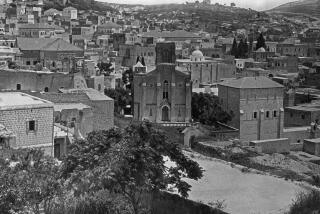Jehan Sadat, widow of former Egyptian President Anwar Sadat, dies at 87

- Share via
CAIRO — Jehan Sadat, the widow of former Egyptian President Anwar Sadat, the first Arab leader to make peace with Israel, died in Egypt on Friday. She was 87.
In recent weeks, Egyptian media reported that Sadat had been hospitalized and was battling cancer. Last year, she received medical treatment in the United States, but shortly after she returned home, her condition deteriorated, her family told local newspapers. No further details about her illness were made available.
On Friday, President Abdel Fattah Sisi’s office said Sadat had been a role model for Egyptian women, and granted her a national award posthumously. Officials also announced the naming of a key highway in Cairo after her.
Jehan Safwat Raouf was born In August 1933 in Cairo to a middle-class Egyptian father and a British mother. In 1949, she married Anwar Sadat, a military officer at the time who later served as Egypt’s president from 1970 until his assassination by Islamic extremists in 1981. The couple had four children: daughters Noha, Gihan and Lobna and a son, Gamal.
Initially, her parents opposed her marriage to a man 15 years her senior, but they eventually let the couple wed.
Sadat consistently defended her husband’s decision to sign a peace agreement with Israel in 1979 after nearly three decades of war, a move that was controversial domestically and regionally.
As more nations veer toward authoritarianism, political elites should recall how the Arab Spring ended when distrust turned to hatred of the opposition.
After her husband’s assassination, Sadat largely withdrew from public life. But in recent years, she emerged as a supporter of former military general Sisi and his government after the country’s 2011 popular uprising forced her husband’s successor, Hosni Mubarak, to resign.
Mubarak’s ouster plunged the country into years of chaos and uncertainty, and set up a power struggle between the military and the long-outlawed Muslim Brotherhood. Some two and a half years after Mubarak’s ouster, Sisi led a military overthrow of Egypt’s first freely elected president and rolled back freedoms gained in the 2011 Arab Spring.
During her husband’s tenure, Sadat established herself as a staunch advocate of women’s rights by pushing for a set of laws that granted women the right to alimony and custody of children in the case of divorce. She also made headlines with her volunteer work and charitable activities. Her high visibility in the 1970s drew criticism from observers who accused her of exploiting her husband’s position to gain political leverage for herself.
She also presided over several national relief agencies, including the Egyptian Red Crescent, the country’s blood bank and the Egyptian Society for Cancer Patients. During Egypt’s 1973 war with Israel, photographs of her visiting the wounded appeared on the front pages of most of the country’s newspapers.
An Egyptian court sentenced several young women to two years in prison for posting “indecent” dance videos on TikTok in a fraught case that critics describe as a further crackdown on self-expression.
Her visibility and political influence as Egypt’s first lady stood in contrast to the low profile kept by Tahia Abdel Nasser, the wife of her husband’s predecessor, former President Gamal Abdel Nasser.
In 1972, Sadat established the Wafa Wal Amal, the Faith and Hope Society, which now operates a fully integrated city for disabled war veterans and civilians. In 1997, she created an endowment to establish the Anwar Sadat Chair for Peace and Development at the University of Maryland in memory of her husband. On the website about the chair, Sadat is quoted as saying: “I never again want to see the face of a starving child or hear the weeping of a mother who has lost her son to war. Peace, this is what my husband gave his life for, and I want the world to know that he did not die in vain. Peace, this is what will make me very happy.”
Anwar Sadat was assassinated Oct. 6, 1981, during a military parade in Cairo. Mubarak, who was seated next to him, escaped with a minor hand injury as gunmen sprayed the reviewing stand with bullets. Days later, Mubarak was sworn in as president.
Under Sadat, the government had sought the support of Islamic groups to counter the influence of leftists. It released hundreds of jailed Muslim Brotherhood members and backed the nascent group Al Gamaa. But the Muslim Brotherhood turned against Sadat, and Al Gamaa grew so radical that it joined forces with another militant group, Islamic Jihad, to assassinate the president.
News Alerts
Get breaking news, investigations, analysis and more signature journalism from the Los Angeles Times in your inbox.
You may occasionally receive promotional content from the Los Angeles Times.
Jehan Sadat graduated with a BA in Arabic literature in 1977 from Cairo University. In 1986, she completed her PhD in comparative literature at the same institution.
She was the author of two books: her autobiography, “A Woman of Egypt,” and “My Hope for Peace,” about the Arab-Israeli conflict and the rise of Islamic extremism. She also served as a visiting instructor at several American universities, including the University of South Carolina, Radford University and the University of Maryland.
More to Read
Sign up for Essential California
The most important California stories and recommendations in your inbox every morning.
You may occasionally receive promotional content from the Los Angeles Times.












